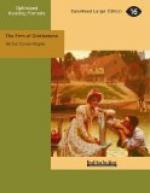“Look here, boss,” said a rough-looking fellow in the front of the crowd, “you keep your hair on, and don’t get slinging words about too freely, or it may be the worse for you and for your office too. We heard as there was big news, an’ we come down to hear it, but as to gettin’ it without paying, that ain’t our sort. I suppose we can call it square if we each hands in sixpence, which is the price o’ your paper, and then you can tell us what’s on.”
O’Flaherty considered for a moment. “It’s worth a shillin’ each,” he said, “for it plays the divil with the circulation of a paper whin its news gits out too soon.”
“Well, we won’t stick at that,” said the miner. “What say you, boys?”
There was a murmur of assent, and a broad-brimmed straw hat was passed rapidly from hand to band. It was half full of silver when it reached O’Flaherty. The Advertiser had never before had such a circulation, for the crowd had rapidly increased during the preceding dialogue, and now numbered some hundreds.
“Thank ye, gintlemen,” said the editor.
“Well, what’s the news?” cried the impatient crowd.
“Sure I haven’t opened the bag yet, but I soon will. Whativer it is it’s bound to be there. Hey there, Billy, ye divil’s brat, where’s the mail bag?”
Thus apostrophized, a sharp little Kaffir came running out with the brown bag, and Mr. O’Flaherty examined it in a leisurely manner, which elicited many an oath from the eager crowd.
“Here’s the Standard and the Times,” he said, handing the various papers out to his subordinate. “Begad, there’s not one of ye knows the expinse of k’aping a great paper loike this going, forebye the brains and no profit at the ind of it. Here’s the Post and the News. If you were men you’d put in an advertisement ivery wake, whether ye needed it or not, just to encourage literature. Here’s the Cape Argus—it’ll be in here whativer it is.”
With great deliberation Mr. Hector O’Flaherty put on a pair of spectacles and folded the paper carefully round, so as to bring the principal page to the front. Then he cleared his throat, with the pomposity which is inseparable with most men from the act of reading aloud.
“Go it, boss!” cried his audience encouragingly.
“’Small-pox at Wellington’—that’s not it, is it? ’Germany and the Vatican’—’Custom House Duties at Port Elizabeth’—’Roosian Advances in Cintral Asia’ eh? Is that it—’Discovery of great Diamond Moines?’”
“That’s it,” roared the crowd; “let’s hear about that.” There was an anxious ring in their voices, and their faces were grave and serious as they looked up at the reader upon the steps of the office.
“‘Diamond moines have been discovered in Roosia,’” read O’Flaherty, “’which are confidently stated to exceed in riches anything which has existed before. It is ginerally anticipated that this discovery, if confirmed, will have a most prejudicial effect upon the African trade.’ That’s an extract from the London news of the Argus.”




